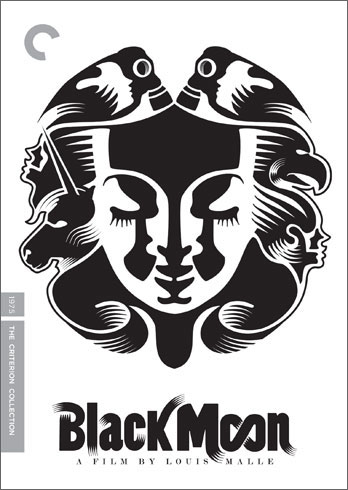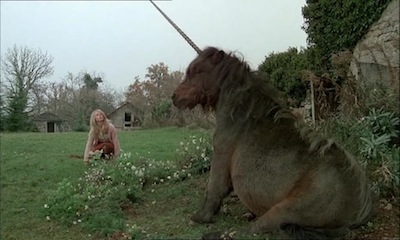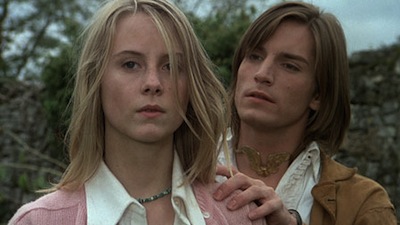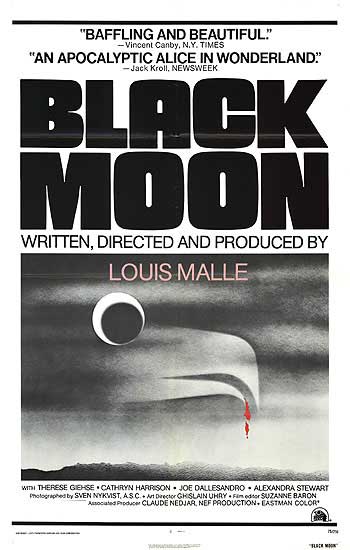
One man's nonsense is...well, another man's nonsense, most likely. But if nonsense is your thing...
If one applies the word "nonsense" as its literal dictionary meaning, then Louis Malle's 1975 surrealistic pill Black Moon doesn't really fit. There's an obvious method to the madness here. Images reoccur, veins of expression expand, Malle builds his dream world by dismantling our own brick by brick. He presents his vision in the form of a journey, a road trip by car and then by foot, and into a realm where the magical and the mundane have swapped places. Unicorns are real, grandmother is not.
The central figure in Black Moon is Lily (Cathryn Harrison), a lone figure wandering a topsy-turvy wasteland. Blonde girl lost in a dreamscape: the Alice comparisons are obvious and intentional, though Malle has dropped her in the middle of Jean-Luc Godard's Weekend rather than any Wonderland. In Malle's wilderness, the human race is at odds. Packs of soldiers roam the countryside, committing summary executions of their enemies. No source of conflict is stated, though we can surmise that divisions have erupted along class and gender divides. Lily runs from anyone with a gun, it doesn't matter whom.

That's how she ends up at a secluded house in the middle of the forest. An old lady (Thérèse Giehse) lays in bed on the top floor, speaking gibberish into her wireless radio. A pair of siblings--a handsome brother (Joe Dallesandro) and pretty sister (Alexandra Stewart)--silently keep her house together and take care of her. The boy works the yard, the girl literally feeds her from her breast. Lily gets stuck there while pursuing a black unicorn. As man has become more isolated from one another, nature has been given rein to run wild. So have children. Innocence is returning. Or maybe it isn't. As a symbol, the unicorn isn't exactly what we expect. The talking horse is judgmental and perhaps is there as an example of temptation itself. Though regularly representing virginity, the unicorn bears witness to Lily surrendering her own purity to a much more common emblem of original sin.
As satire and as surrealism, Black Moon is curiously simplistic while also maddeningly obtuse. It's not as pointed as, say, Luis Buñuel's The Discreet Charm of the Bourgeoisie [review], which used confined spaces and open roads to expose that, despite their high-falutin' airs, modern society types are still subject to base urges. (Buñuel's daughter-in-law Joyce is credited with "additional dialogue" on Black Moon.) Malle's excursion through the fantastic is a little harder to pin down. The landscape keeps changing, so much so that you'll almost wish you'd began drawing a map when the movie started so you could find your way out. Singular images have potency (one burial of a dead soldier should cause anyone who fears suffocation to get a little anxious, particularly after you see the actor accidentally move under the soil), and there are gags that build and expand (the ever-growing pig). It's also wonderful to look at, as any dream should be, though cinematographer Sven Nykvist lights this headspace so that it appears overcast, a crushing gray always on the horizon. Performances are a little less consistent. Cathryn Harrison carries on stalwartly, but Dallesandro is terrible. He doesn't even speak and he's terrible! Then again, when wasn't he?

Thankfully, for as ambiguous or contrived as Black Moon can feel at times--Malle, really, was better when he was embracing humanity, and I sometimes question his comedic chops (Viva Maria!

For a complete rundown on the special features, read the full review at DVDTalk.

No comments:
Post a Comment